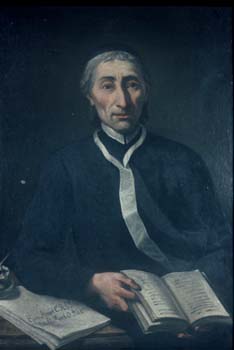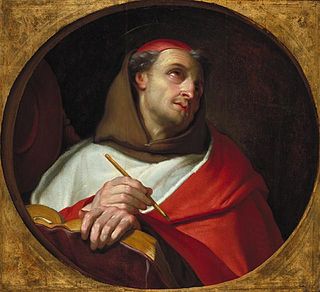
Alexander of Hales, also called Doctor Irrefragibilis and Theologorum Monarcha, was a Franciscan friar, theologian and philosopher important in the development of scholasticism.

Eusebius Amort was a German Roman Catholic theologian.

Bonaventure was an Italian Catholic Franciscan bishop, cardinal, scholastic theologian and philosopher.

Friedrich Daniel Ernst Schleiermacher was a German Reformed theologian, philosopher, and biblical scholar known for his attempt to reconcile the criticisms of the Enlightenment with traditional Protestant Christianity. He also became influential in the evolution of higher criticism, and his work forms part of the foundation of the modern field of hermeneutics. Because of his profound effect on subsequent Christian thought, he is often called the "Father of Modern Liberal Theology" and is considered an early leader in liberal Christianity. The neo-orthodoxy movement of the twentieth century, typically seen to be spearheaded by Karl Barth, was in many ways an attempt to challenge his influence. As a philosopher he was a leader of German Romanticism. Schleiermacher is considered the most important Protestant theologian between John Calvin and Karl Barth.

Johann Joseph Ignaz von Döllinger, also Doellinger in English, was a German theologian, Catholic priest and church historian who rejected the dogma of papal infallibility. Among his writings which proved controversial, his criticism of the papacy antagonized ultramontanes, yet his reverence for tradition annoyed the liberals.
Godfrey of Fontaines, in Latin Godefridus de Fontibus, was a scholastic philosopher and theologian, designated by the title Doctor Venerandus. He made contributions to a diverse range of subjects ranging from moral philosophy to epistemology. However, he is best known today for his work on metaphysics.

Joseph Hergenröther was a German Church historian and canonist, and the first Cardinal-Prefect of the Vatican Archive.
Francis of Meyronnes was a French scholastic philosopher. He was a distinguished pupil of Duns Scotus, whose teaching (Scotism) he usually followed.

Petrus Aureoli, often anglicized Peter Auriol, was a scholastic philosopher and theologian.
Heinrich Joseph Dominicus Denzinger was a leading German Catholic theologian and author of the Enchiridion symbolorum et definitionum, a work commonly referred to simply as Denzinger after him.

John de Lugo (1583–1660), a Spanish Jesuit and Cardinal, was an eminent scholastic theologian of the Baroque.
Maximilian van der Sandt, S.J., known as Sandaus or Sandaeus, was a noted Dutch Jesuit theologian.
Heinrich Klee was a German theologian and Biblical exegete who argued against liberal and Rationalist currents in Catholic thought.

Franz Hettinger was a German Catholic theologian.
Joseph Nirschl was a German Catholic theologian and writer.
Alfonso Muzzarelli was an Italian Jesuit theologian and scholar.
Catholic dogmatic theology can be defined as "a special branch of theology, the object of which is to present a scientific and connected view of the accepted doctrines of the Christian faith."
Benjamin Elbel was a German Franciscan moral theologian.
Francis Jeremiah Connell, C.Ss.R., was a Redemptorist priest, professor, author, and noted Catholic American theologian. He was born in Boston, Massachusetts, and died in Washington, D.C.

John Duns Scotus was a Scottish Catholic priest and Franciscan friar, university professor, philosopher and theologian. He is one of the four most important Christian philosopher-theologians of Western Europe in the High Middle Ages, together with Thomas Aquinas, Bonaventure and William of Ockham.









